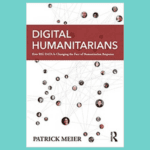(Photo: Gareth Davies)
 Patrick Meier participated in the Bellagio residency program in 2014. During this residency he worked on Digital Humanitarians: How Big Data Is Changing the Face of Humanitarian Response. He is a co-founder and Executive Director of WeRobotics, holds a PhD from the Fletcher School at Tufts University, and has worked for more than 15 years in humanitarian technology.
Patrick Meier participated in the Bellagio residency program in 2014. During this residency he worked on Digital Humanitarians: How Big Data Is Changing the Face of Humanitarian Response. He is a co-founder and Executive Director of WeRobotics, holds a PhD from the Fletcher School at Tufts University, and has worked for more than 15 years in humanitarian technology.
A few words with Patrick
“Before my residency, I had a detailed book outline and had completed 90% of the research. I used my four weeks at the Bellagio Center to write a complete working draft. The peace, quiet, beauty, and serenity of the Rockefeller Foundation’s Bellagio Center was the perfect intellectual oasis to think, write, question, and write some more.
“One of my chapters touched on the use of drones in humanitarian efforts. As I wanted to better understand the technology, I brought a small quadcopter drone with me to Bellagio. Long story short, I got hooked with flying. I experienced the power of seeing patterns that can only be seen through a bird’s eye view and the power of responsibility that comes with using new and emerging technologies. My interest in drones for social good grew considerably thanks to my time in Bellagio.”
Synopsis
During disasters and crises, the overflow of information generated by mobile phones, orbiting satellites and uncrewed aerial vehicles (UAVs) can paralyse humanitarian response. How can we make sense of this overflow?
Digital Humanitarians: How Big Data Is Changing the Face of Humanitarian Response explores how the rapid mobilisation of volunteers and professionals from all over the world – in collaboration with international humanitarian organizations – are supporting relief efforts worldwide. In real-time, these so-called digital humanitarians are able to make sense of the vast volume of data, by leveraging crowdsourced mobile technologies and AI insights. Disaster-affected areas can now be analysed in hours, rather than days or weeks.
This book charts the sudden rise of the digital humanitarian through inspiring real-life stories. Case studies include the Haiti earthquake and Typhoon Pablo in the Philippines. New actors and their collaborative solutions to Big Data are changing humanitarian response forever.
Explore More
To find out more about Patrick’s work, read his story in Time or visit WeRobotics.
Or you can simply follow him on Twitter.
Related

September 2022
Welcome to the second Bellagio Bulletin, where you’ll learn of the many ways that the Bellagio Center has supported the work of the world’s leading thinkers. We, at The Rockefeller Foundation, are committed to gender equality and the Bellagio Center has helped us to advance the global gender equality agenda. The activities and conversations at […]
More